Samsung SSD 840 (250GB) Review
by Kristian Vättö on October 8, 2012 12:14 PM EST- Posted in
- Storage
- SSDs
- Samsung
- TLC
- Samsung SSD 840
Performance Over Time & TRIM
For starters, I ran HDtach on a secure erased drive to get the baseline performance:
Next I secure erased the drive again, filled it with compressible data and proceeded with torturing it for 20 minutes with compressible 4KB random writes (100% LBA space, QD=32):
Ouch, performance takes a big hit. Usually 20 minutes isn't enough to put 256GB drives on their knees but it definitely is for the 840. Write speed drops to as low as 25MB/s, although it's nearly restored before all user-accessible LBAs have been filled. The way to avoid this worst case state is to keep as much free space on your drive as possible. We typically recommend around 20%, however with TLC NAND it might be advisable to bump that up to 30%. The 840 Pro will be a better option for heavy write workloads already due to its higher endurance.
To see how idle time is able to restore performance, I let the drive idle for 50 minutes:
Write speed is fully restored but for some reason, read speed is fluctuating. The drop isn't huge as we are still talking about +350MB/s at all times, but it's interesting and a bit odd to see this kind of behavior since read speed was ~425MB/s after torture.
Finally I secure erased the drive again, filled it, tortured for 20 minutes and TRIM'ed it:
Again we see some weird behavior as write speed is not fully restored after TRIM. It does get to 250MB/s at the end of the HDtach run, but the starting performance is only 150MB/s. Keep in mind that I TRIM'ed the drive right after the torture; I didn't run HDtach in between like we often do but a functioning TRIM should still fully restore performance. Remember that TRIM is still just a suggestion—it's up to the controller to prioritize TRIMed LBAs for garbage collection. Given the higher program/erase latencies with TLC NAND it's entirely possible that the 840's garbage collection routine is just slower than we're used to seeing. Another possibility is that with the fewer number of P/E cycles, the 840 is just very conservative about using them when it's not stricly necessary (e.g. ignoring some of the TRIM "suggestions").
As a final test, I TRIM'ed the drive again and ran HDtach:
And now performance is what it should be. This is mostly due to sequential writes because at the end of the previous HDtach run, write performance was already at 250MB/s.


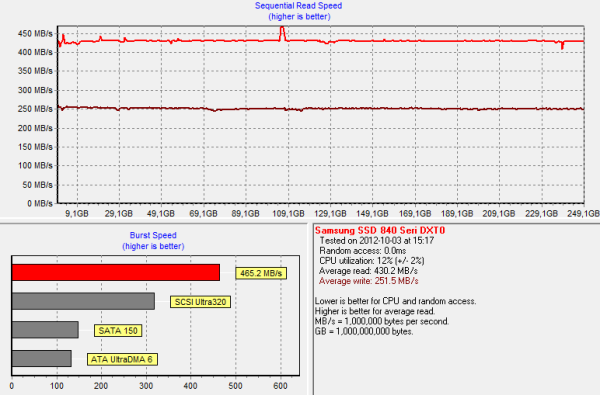
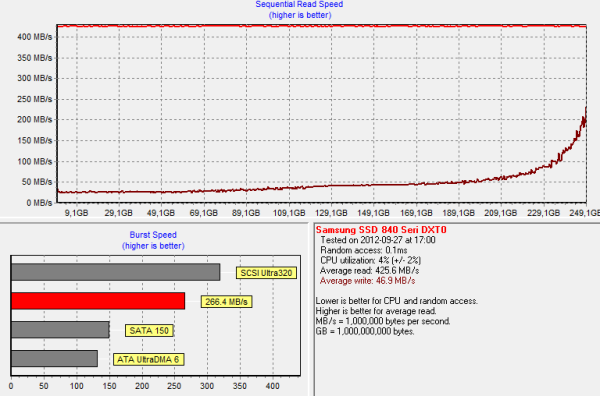
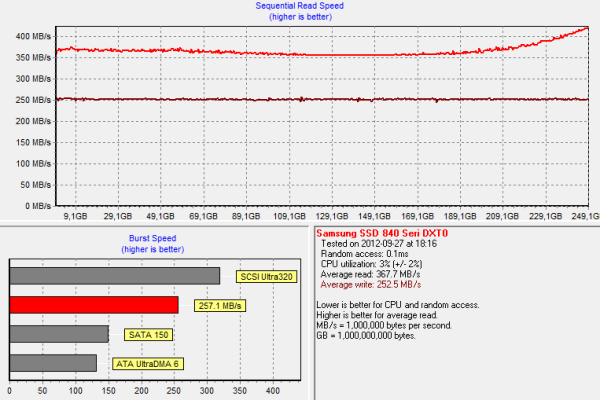
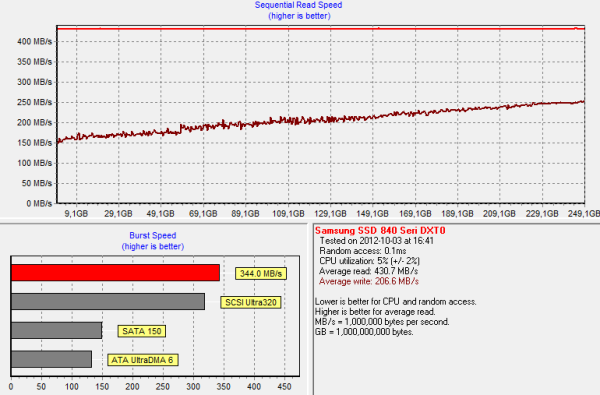
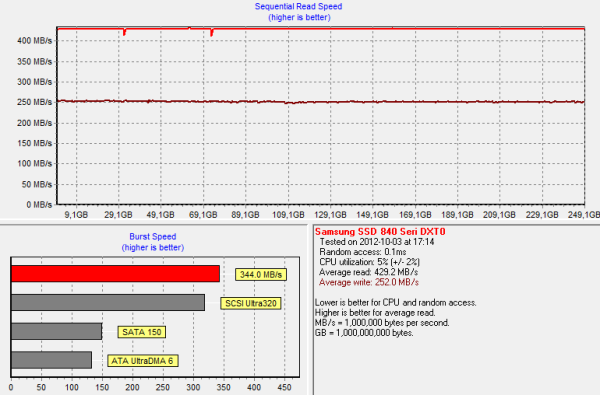








86 Comments
View All Comments
JarredWalton - Monday, October 8, 2012 - link
What price are you looking at? The table shows $199.99 for the 250GB Samsung 840 (MSRP) and $249.99 for the 256GB Samsung 840 Pro.Kevin G - Monday, October 8, 2012 - link
On the fourth page:"With perfect wear-leveling and write amplification of 1x, you would get 256TiB of writes out of a 250GB Samsung 840 with TLC NAND and 1,000 P/E cycles. "
Shouldn't it be 256 GiB?
JarredWalton - Monday, October 8, 2012 - link
No; he's accounting for the visible storage capacity (and spare area). So 250GB is 256GiB of NAND but only 250GB end-user storage. You can still write 256TiB of data (256GiB * 1000 P/E), which means on a 250GB SSD you end up with the ability to write 281TB of data (for an effective P/E cycles of 1125).schizoide - Monday, October 8, 2012 - link
I'm not comfortable with TLC, particularly since it doesn't come at a huge absolute cost savings. I've been burned too often with SSDs, and now only buy the most bulletproof devices available. Maybe next generation. Maybe.Death666Angel - Tuesday, October 9, 2012 - link
I wouldn't draw any conclusion for pricing just yet. Everyone is comparing street prices of current gen SSDs to MSRP of next gen SSDs. Give it a few months to get the 840 into stores and selling and then we'll se how prices fair.I'm personally fairly confident that there will be a distinct cost advantage.
name99 - Tuesday, October 9, 2012 - link
Have ANY SSDs given you a failure based on the flash cells themselves, rather than on crappy firmware?It's stupid to demonize a technology because some companies sold you a bad product --- especially when your response is to refuse to buy a product from a company that is known (in this respect at least) NOT to have shipped crappy firmware.
harijan - Monday, October 8, 2012 - link
Pretty sure 3650GiB != 3.65TiB.3650GB == 3.65TB.
It doesn't do anything to your percentages, but this is Anandtech, we hold you to higher standards ;)
Kristian Vättö - Tuesday, October 9, 2012 - link
You are correct, I forgot that binary units don't scale up linearly (1000GiB is not 1TiB); metrics are just so much simpler. Thanks for the heads up, I've fixed the math now.iaco - Monday, October 8, 2012 - link
I wonder if Samsung will ever make a SSD made of SLC NAND. The performance would be amazing.Conficio - Monday, October 8, 2012 - link
First thanks to the Kristan and the Anand Team for another comprehensive review and the inclusion of in depth knowledge about the technology behind it.I'd like to see included in the test (or in another article) a review of the available tools for each SSD. I think it is important to know if the manufacturer supports its tools to low level format, secure erase, TRIM, ROM update etc. beyond the obligatory Windows (7). Are those available for Linux (command line and/or GUI)? Are they available for Mac OSX? Do they work if the drive is connected over USB? Are these tools user friendly to use?
It is useless if I buy an SSD and have to find out that Mac OSX does not support the tools. I have a couple of Vertex drives which I can't find a way to secure erase in order to restore full performance. They are pre TRIM drives and Mac OS X does not support trim on them anyway.
As with motherboards, the the BIOS or UEFI is important, so is with SSDs the ability to actually perform some of the low level functions. I hope you can add that to your workload! A comparison of the different tools for each manufacturer for current drives would be a great start. Thanks again!